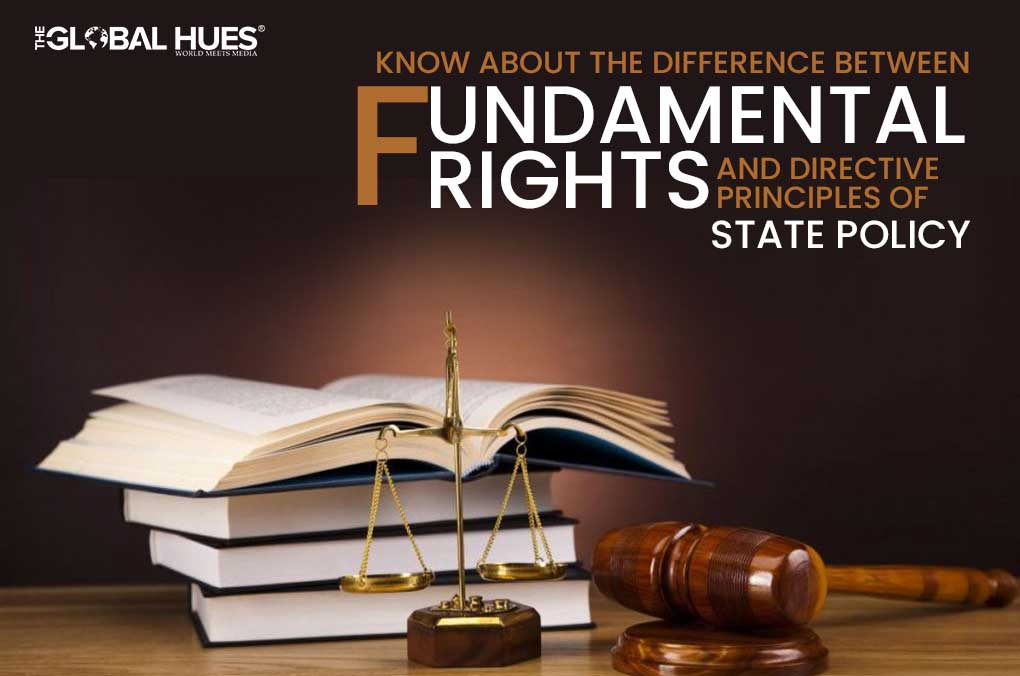Parts III and IV of the Indian constitution, respectively, deal with fundamental rights and directive principles. They are two sides of the same coin that compliment each other and comprise the “conscience” of the Indian constitution.
Fundamental rights ensure political democracy, whereas directive principles promote economic and social democracy. Fundamental Rights are human rights that Indian citizens are awarded. The values that the state should keep in mind when making policies and passing legislation are known as Directive Principles of State Policy.
The difference between fundamental rights and directive principles of state policy will help the UPSC Civil Service aspirants better understand the basics and know their comparisons thoroughly. Let’s have a look at how they differ.
The following are the main differences between Fundamental Rights and State Policy Directive Principles:
| Fundamental Rights | Directive Principles of State Policy |
| Part 3 of the Indian Constitution comprises the Fundamental Rights given to Indian citizens. Fundamental Rights are addressed in Articles 12-35 of the Indian Constitution. | Part 4 of the Indian Constitution contains Directive Principles. They are contained in Articles 36-51 of the Indian Constitution. |
| Fundamental Rights are the fundamental rights given to the Indian people by the Indian Constitution. | The Directive Principles of the Indian Constitution are the rules that the government must follow when developing policy. |
| Political democracy is developed in India thanks to the Fundamental Rights enshrined in the Indian Constitution. | The Directive Principles of State Policy help to develop Economic and Social Democracy. |
| The Fundamental Rights promote the well-being of each and every individual. | The welfare of the entire community is promoted through Directive Principles. |
| Fundamental rights violations are penalised under the law. | In contrast to violations of Fundamental Rights, violations of Directive Principles are not criminal crimes. |
| Fundamental rights are justifiable in the sense that they can be lawfully enforced by courts if they are violated. | Directive Principles are not justiciable in the sense that they cannot be enforced by the courts if they are violated. |
| If there is a law which is in violation of fundamental rights then the courts can declare it invalid and unconstitutional. | If a statute violates the Directive Principles, the courts lack the authority to declare it unlawful and unconstitutional. |
| Fundamental Rights are sometimes viewed as constraints imposed on the state. | Directive Principles are rules that the government must abide by in order to accomplish certain objectives. |
| A national emergency may result in the suspension of fundamental rights. However, the rights outlined in Articles 20 and 21 cannot be suspended. | Under no circumstances can the Directive Principles of State Policy be suspended. |
| The fundamental rights were taken from the United States Constitution. | Directive Principles of State Policy were derived from the Irish Constitution, which was copied from the Spanish Constitution. |
The differences between the Fundamental Rights and the Directive Principles of State Policy suggest that they both have distinct but equivalent goals and objectives. Each component of the Constitution, as well as the elements themselves, complement one another. It is vital to understand the importance of each and to apply/use them correctly.
Fundamental Rights are public rights, whereas Directive Principles are responsibilities that the state must fulfil, despite the fact that the Directive Principles include some social and economic rights. They seek to promote democratic and welfare ideas together, which can only be accomplished if both parties collaborate without confrontation.
These are the primary differences between Fundamental Rights and State Policy Directive Principles (DPSP). The differences listed in the table above can assist UPSC Civil Service Exam candidates in answering any related questions in the exams.
Must Read:
- SUCCESS STORY OF TIM COOK: A MAN WITH A VISION
- TOP 10 RICHEST BILLIONAIRES IN THE WORLD 2022
- Top 10 Indian Origin CEOs Leading International Companies
- HIGHEST-PAID CEOs IN THE WORLD
- Success Story Of Mukesh Ambani
- TOP 10 NEWSPAPERS IN THE WORLD 2022
- Elon Musk: Biography Of A Self-Made Entrepreneur And Billionaire
- 10 GADGETS TO KEEP YOU COOL THIS SUMMER
- 7 R’s Of Waste Management – Steps To Sustainability
- What Are The 5 Must Watch Netflix Thrillers
- Upcoming Shows And Films On Netflix In 2022



